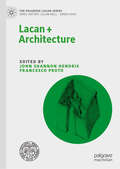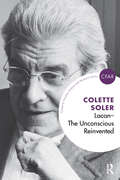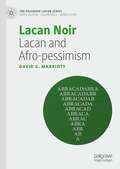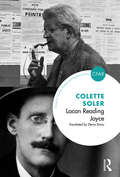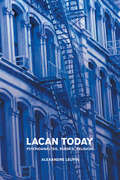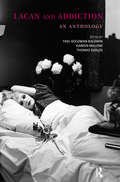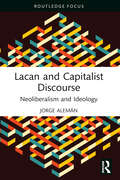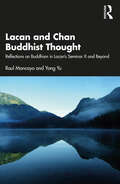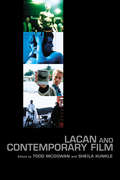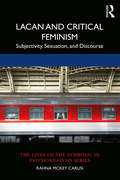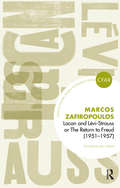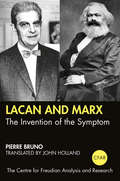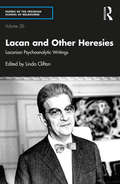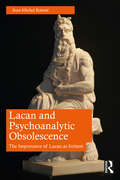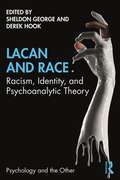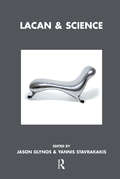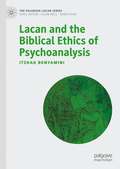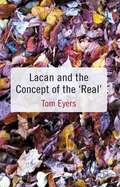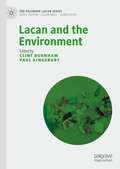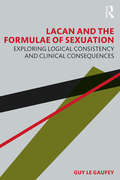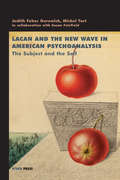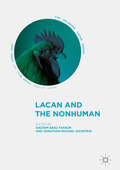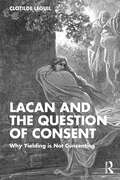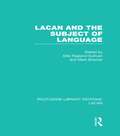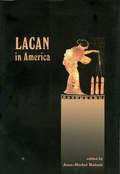- Table View
- List View
Lacan + Architecture (The Palgrave Lacan Series)
by John Shannon Hendrix Francesco ProtoThis book seeks to revise and revive architectural theory through psychoanalysis as well as to apply psychoanalytic theory to architecture. Its authors argue for Lacan’s central importance for a comprehensive theory of building and suggest how architectural theory might offer new resources for psychoanalytic theorists. They address both the perceived crisis in the contemporary state of architecture and architectural theory and crises in society at large, including political and economic fracture and instability and threats to mental health and well-being. It offers fresh insights to architects, architectural educators and practitioners, scholars of psychoanalysis, and anyone interested in the human condition in relation to the built environment.
Lacan - The Unconscious Reinvented: The Unconscious Reinvented (The Centre for Freudian Analysis and Research Library (CFAR))
by Colette SolerThis book focuses on Lacan's revisions and renewals of psychoanalytic concepts, and shows the ways in which Lacan succeeded in the reinvention of psychoanalysis. It explores those steps that led him to assert an unprecedented formula that says against all expectation that the unconscious is real.
Lacan Noir: Lacan and Afro-pessimism (The Palgrave Lacan Series)
by David S MarriottThis book explores how Jacques Lacan has influenced Black Studies from the 1950s to the present day, and in turn how a Black Studies framework challenges the topographies of Lacanianism in its understanding of race. David Marriott examines how a contemporary Black Studies perspective might respond to the psychoanalysis of race by taking advantage of the recent revitalization of Lacanianism in its speculative, metaphysical form. While the philosophical side of the debate makes a plea for a new universalism, this book proposes a Lacanian reassessment of the notion of race, a notion distinct from culture, language, religion, and identity. It argues that it is possible to re-establish the theoretical relation between capitalism, anti-blackness, and colonialism, by reassessing the links between Lacanian psychoanalysis and three main domains of black inquiry: mastery, knowledge, and embodiment. The book offers a strikingly original rereading of the place of Lacan in both Fanon Studies and Afro-pessimism. It will appeal to students and scholars of Black Studies, Cultural Studies, Critical Theory and Philosophy.
Lacan Reading Joyce (The Centre for Freudian Analysis and Research Library (CFAR))
by Colette SolerThis book discusses Jacques Lacan’s contribution to understanding the life and work of James Joyce, introducing Colette Soler’s influential reading to English readers for the first time. Focusing on Lacan’s famous Seminar on Joyce, the reader will no doubt learn much from Lacan, but also, as Soler shows, what Lacan learned from Joyce and what perhaps, without him, he would not have approached with so much confidence. Le Sinthome. This is the title Jacques Lacan chose for his seminar devoted to Joyce in 1975–76. He wrote the word 'sinthome' in its original spelling, from the Greek, and thus used the technique so dear to Joyce: the equivocation between the sound that is heard and the graphic representation that is seen. Is it surprising that the author who recognised in 1956 with 'The Agency of the Letter in the Unconscious' that the Freudian practice of speech revealed an unconscious that writes – something Jacques Derrida found quite remarkable – would end in 1975–76 with Joyce? Lacan Reading Joyce will be of great interest to professional and academic readers in the respective fields of Lacan and Joyce studies, including psychoanalysts in practice and training, as well as researchers and students in psychoanalytic and modern literary studies.
Lacan Today: Psychoanalysis, Science, Religon
by Alexandre LeupinLacan Today: Psychoanalysis, Science, Religion offers a lucid overview of the French psychoanalyst's work. In five sections--"The Structure of the Subject," "Epistemology," "Four Discourses," "There is No Sexual Rapport," and "God is Real,"--the book maps out Lacan's thought for the lay reader with unmatched clarity. It does this by building from Lacan's graph and formulas, which are often misunderstood. This formalization acts as a pedagogical tool of wonderful economy, offering a broad overview without neglecting the essential details. The chapters are summarized by a general graph that visually demonstrates Lacan's rigor and coherence.The book examines often-neglected aspects of Lacan's work, like problems in the history of science, epistemology, and religion, in order to show Lacan's relevance to today's world. It makes the case for Lacan as one of the most important thinkers of the twentieth century, whose reach extends beyond the discipline of psychoanalysis. Indeed, Lacan's thought should lead readers into a reexamination of philosophy, literature, art, politics, economy, and desire.In his introduction, Alexandre Leupin writes: "If the unconscious exists, then Lacan is the only twentieth-century thinker who has drawn the consequences of Freud's discovery to their ultimate limits. I propose here what some will take as bombastic hyperbole: Lacan's radical reevaluation of human thinking is comparable to Einstein's."Though Lacan's thought is making tremendous inroads in countries of Latin culture, it has been slowly fading from public awareness in the English-speaking world. Often Lacan has been nothing more than a pawn in the bundling of contradictory doctrines labeled as "French thought"; or he has been reduced to a means of exchange between psychoanalysts or specialists in the humanities. Leupin's contention is that what Lacan said or wrote is of interest to the general public and that his consignment to oblivion is reversible. This book demonstrates that Lacan's thinking has vast implications, not only for college professors or practicing psychoanalysts, but also for scientists, epistemologists, and every man and woman.
Lacan and Addiction: An Anthology
by Yael Goldman BaldwinWith chapters from Rik Loose, Fabian Naparstek, Patricia Gherovici, Bruce Fink, Thomos Svolos and many others, the anthology is for people interested in the topic of addictions, or in Lacanian psychoanalysis, and especially for those interested in how the two intersect. Lacan and Addiction is based on papers presented at a 2006 conference where Lacanians from around the world gathered to speak about addictions. Conference participants explored the complexity of the problem for the individual, society, clinicians, and for treatment. In the current climate, where addiction is mostly treated by variations of twelve step approaches and psychopharmacological "countermeasures", it is all too easy to lose sight of the dimensions of addiction that render it not just a disease to be managed but rather a significant form of human suffering and a subjective responsibility, both of which are critical components of addiction treatment. More and more, addiction treatment is turning away from psychological and psychoanalytic theorization and towards psychopharmacological measures; this anthology attempts to rectify that situation.
Lacan and Capitalist Discourse: Neoliberalism and Ideology
by Jorge AlemánLacan and Capitalist Discourse explores the political and theoretical connections between the Covid-19 Pandemic and Capitalism, unravelling the direct consequences of Lacan's thesis of so-called "Capitalist Discourse”. Jorge Alemán provides an account of neoliberalism, its mechanisms to produce subjectivities and the new modes of the political far Right. The book begins with the problem of a possible exit from capitalism, continuing to consider the possibilities of mourning and the active production of a new Left. Alemán engages deeply with a range of thinkers: primarily Lacan, but also Heidegger, Marx, Laclau, Foucault, Butler, Badiou, Althusser, and others, in making his case. Lacan and Capitalist Discourse will be of great interest to psychoanalysts and to academics of psychoanalytic and Lacanian studies, cultural theory, philosophy and political thought.
Lacan and Chan Buddhist Thought: Reflections on Buddhism in Lacan’s Seminar X and Beyond
by Yang Yu Raul MoncayoLacan and Chan Buddhist Thought provides a close reading of how Lacan mobilizes concepts from Chan Buddhist philosophy, culture, and practice in his later teachings. The book emerged from the three co-authors’ engagement with Lacan’s 1962–1963 Seminar on Anxiety, and the significance of Lacan’s original interpretation of the Buddhist principle that desire is the cause of suffering. The book reads key Lacanian concepts – such as the objet a, jouissance, the real, Nirvana, and the mirror – through ancient Buddhist teachings and koans. With this focused exploration of psychoanalysis and Chan Buddhism, the authors offer a philosophically grounded cross-cultural approach to the theory and practice of psychoanalysis in Asian countries. Lacan and Chan Buddhist Thought will be a rich resource for psychoanalysts, academics, and students interested in Lacan and religion, the intellectual and cultural relationship between Asian and Western thought, and Mahayana Buddhism more generally.
Lacan and Contemporary Film (Contemporary Theory Ser.)
by Todd McgowanThis unique volume collects a series of essays that link new developments in Lacanian psychoanalytic theory and recent trends in contemporary cinema. Though Lacanian theory has long had a privileged place in the analysis of film, film theory has tended to ignore some of Lacan's most important ideas. As a result, Lacanian film theory has never properly integrated the disruptive and troubling aspects of the filmic experience that result from the encounter with the Real that this experience makes possible. Many contemporary theorists emphasize the importance of the encounter with the Real in Lacan's thought, but rarely in discussions of film. By bringing the encounter with the Real into the dialogue of film theory, the contributors to this volume present a new version of Lacan to the world of film studies.These essays bring this rediscovered Lacan to bear on contemporary cinema through analysis of a wide variety of films, including Memento, Eyes Wide Shut, Breaking the Waves, and Fight Club. The films discussed here demand a turn to Lacanian theory because they emphasize the disruptive role of the Real and of jouissance in the experience of the human subject. There is a growing number of films in contemporary cinema that speak to film's power to challenge and disturb the complacency of spectators, and the essays in Lacan and Contemporary Film analyze some of these films and bring their power to light.Because of its dual focus on developments in Lacanian theory and in contemporary film, this collection serves as both an accessible introduction to current Lacanian film theory and an introduction to the study of contemporary cinema. Each essay provides an accessible, jargon-free analysis of one or more important films, and at the same time, each explains and utilizes key concepts of Lacanian theory. The collection stages an encounter between Lacanian theory and contemporary cinema, and the result is the enrichment of both.
Lacan and Critical Feminism: Subjectivity, Sexuation, and Discourse
by Rahna McKey CarusiThis book takes a critical feminist approach to Lacan’s fundamental concepts, merging discourse and sexuation theories in a novel way for both psychoanalysis and feminism, and exploring the possibility of a feminist subject within a non-masculine logic. In Lacan and Critical Feminism, Carusi merges Lacan’s theories of discourse and sexuation, not only from a gender/sexuality angle, but also from a literary, feminist, and women’s studies framework. By drawing examples from literature, film, art, and socio-political movements to focus on discourse and sexuation, the text examines how tropes impact the subject’s positionality within any discourse mode. The book also uses women’s collective experience and action to illustrate ways that women have repositioned dominant narratives discursively. This text represents essential reading for researchers interested in the relationship between Lacan and feminist theory.
Lacan and Levi-Strauss or The Return to Freud (The Centre for Freudian Analysis and Research Library (CFAR))
by Markos ZafiropoulosLacan and Levi-Strauss are often mentioned together in reviews of French structuralist thought, but what really links their distinct projects? In this important study, the author shows how Lacan's famous 'return to Freud' was only made possible through Lacan's reading of Levi-Strauss. Via a careful and illuminating comparison of the work of the psychoanalyst and that of the anthropologist, Zafiropoulos shows how Lacan's theories of the symbolic function, of the power of language, of the role of the father and even of the unconscious itself owe a major debt to Levi-Strauss. Lacan and Levi-Strauss is much more than an academic study of the relations between these two thinkers: it is also a superb introduction to the work of Lacan, setting out with detail and lucidity the major concepts of his work in the 1950s.
Lacan and Marx: The Invention of the Sympton (The Centre for Freudian Analysis and Research Library (CFAR))
by Pierre BrunoLacan and Marx: The Invention of the Symptom provides an incisive commentary on Lacan’s reading of Marx, mapping the relations between these two vastly influential thinkers. Unlike previous books, Bruno provides a detailed history of Lacan’s reading of Marx and surveys his references to Marx in both his writings and seminars. Examining Lacan’s key argument that Marx "invented the symptom", Bruno shows how Lacan went on to criticize Marx and contrasts Marx’s concept of surplus-value with Lacan’s surplus-enjoyment. Exploring the division between Marxist and psychoanalytic perspectives on social and psychological need and Lacan’s formalisation of the capitalist discourse, the book compares the positions of Althusser, Deleuze and Guattari, and Žižek on the relations between Lacan, Marx and capitalism, using a wide range of cultural examples, from Stevenson’s Dr. Jekyll and Mr. Hyde to Brecht’s Joan Dark and Pierpont Mauler. Through these readings, Bruno also elaborates an extended commentary on Lacan’s central idea of the division of the subject. His focus is not only on showing how we can exit from capitalism but also, and just as importantly, on showing how we can make capitalism exit from us. This book will be of great interest to scholars and readers of Lacan and Marx from across the fields of psychoanalysis, philosophy and political economy, and will also appeal to Lacanian psychoanalysts in clinical practice.
Lacan and Other Heresies: Lacanian Psychoanalytic Writings (Papers of the Freudian School of Melbourne)
by Linda CliftonThis volume gathers together the recent writings of the analysts and members of the Freudian School of Melbourne and the Belgian analyst Christian Fierens, displaying the ongoing interrogation by the School of Lacanian psychoanalysis into its history, theories and practices. Within the framework of Lacan’s interventions in Freudian psychoanalysis, the book in particular highlights Lacan’s inventions in theoretical discourse and clinical practice, including the no-sexual relation, the discursive structures of language, the school, the cartel and the pass. Theoretical shibboleths such as the Oedipus complex are questioned, while the historical writings of Sabina Spielrein are read and interpreted anew. Chapters also engage with the psychoanalysis of children, the questions posed by the psychoses to psychoanalysis and the intersection of creativity and the arts in new and original ways. Bringing together a range of expert contributions, this text will be an illuminating resource for scholars and practitioners of psychoanalysis.
Lacan and Psychoanalytic Obsolescence: The Importance of Lacan as Irritant
by Jean-Michel RabatéThis book explores the importance of Lacan’s role as an irritant within psychoanalysis, and how Freud and Lacan saw that as key to ensuring that psychoanalysis remained fresh and vital rather than becoming obsolescent.Drawing on Freud’s thinking as well as Lacan’s, Rabate examines how Lacan’s unwillingness to allow psychoanalytic thinking to become stale or pigeonholed into one part of life was key in his thinking. By constantly returning to psychoanalytic ideas in new and evolving ways, Lacan kept psychoanalysis moving and changing, much as Socrates did for philosophical thinking in classical Athens. This ‘gadfly’ or irritant role gave him free reign to explore all aspects of psychoanalytic thinking and treatment, and how it can permeate all aspects of life, both in the consulting room and beyond.Drawing on a deep understanding of Lacan’s work as well as Freud’s, this book is key reading for all those seeking to understand why Lacan’s work remains so important and so challenging for contemporary psychoanalysis.
Lacan and Race: Racism, Identity, and Psychoanalytic Theory (Psychology and the Other)
by Sheldon GeorgeThis edited volume draws upon Lacanian psychoanalytic theory to examine the conscious and unconscious forces underlying race as a social formation, conceptualizing race, racial identity, and racism in ways that go beyond traditional modes of psychoanalytic thought. Featuring contributions by Lacanian scholars from diverse geographical and disciplinary contexts, chapters span a wide breadth of topics, including white nationalism and contemporary debates over confederate monuments; emergent theories of race rooted in Afropessimism and postcolonialism; analyses of racism in apartheid and American slavery; clinical reflections on Latinx and other racialized patients; and applications of Lacan’s concepts of the lamella, drive and sexuation to processes of racialization. The collection both reorients readers’ understandings of race through its deployment of Lacanian theory and redefines the Lacanian subject through its theorizing of subjectivity in relation to race, racism and racial identification. Lacan and Race will be a definitive text for psychoanalytic theorists and contemporary scholars of race, appealing to readers across the fields of psychology, cultural studies, humanities, politics, and sociology.
Lacan and Science
by Yannis Stavrakakis Jason GlynosThe current volume represents an exciting collection of essays critically examining the relation between modern science and Lacanian psychoanalysis in approaching the question of mental suffering. Lacan & Science also tackles more widely the role and logic of scientific practice in general, taking as its focus psychic processes. Central themes that are explored from a variety of perspectives include the use of mathematics in Lacanian psychoalanysis, the importance of linguistics and Freud's text in Lacan's approach, and the central significance attached to ethics and the role of the subject. Constituting an invaluable addition to existing literature, this comprehensive volume offers a fresh insight into Lacan's conception of the subject and its implications to scientific practice and evidence.
Lacan and the Biblical Ethics of Psychoanalysis (The Palgrave Lacan Series)
by Itzhak BenyaminiIn this fascinating and ground-breaking book, Itzhak Benyamini uses discourse analysis to lay out the way Lacan constructed his own intellectual discourse informed by Judeo-Christianity. Offering an understanding of Lacan’s emergence and intellectual struggles with significant contemporary intellectuals, the author builds a panoramic view of the entire psychoanalytic discourse at the time of the foundational post-Freudian generation. By engaging in close reading of texts and seminars given by Lacan between the 1930s and 50s, Benyamini uncovers the coming-into-being of Lacan's key concepts: The Mirror Stage, the Imaginary, the Real, the Symbolic, the Name-of-the-Father, the Other, jouissance, and das Ding. The author argues that Lacan wished to regulate this process of conceptualization by connecting the concepts of the "Father" and the "Other" with themes from the Judeo-Christian tradition, especially the Biblical one, to create a clinical ethic, that does not reflect a worldview or ideology and is guided solely by the analyzand’s unconscious desire.
Lacan and the Concept of the ‘Real’: Charities, Civil Society And The Voluntary Sector Since 1945
by Tom EyersThis is the first book in English to explore in detail the genesis and consequences of Lacan's concept of the 'Real', providing readers with an invaluable key to one of the most influential ideas of modern times.
Lacan and the Environment (The Palgrave Lacan Series)
by Clint Burnham Paul KingsburyIn this exciting new collection, leading and emerging Lacanian scholars seek to understand what psychoanalysis brings to debates about the environment and the climate crisis. They argue that we cannot understand climate change and all of its multifarious ramifications without first understanding how our terrifying proximity to the real undergirds our relation to the environment, how we mistake lack for loss and mourning for melancholy, and how we seek to destroy the same world we seek to protect. The book traces Lacan’s contribution through a consideration of topics including doomsday preppers, forest suicides, Indigenous resistance, post-apocalyptic films, the mathematics of climate science, and the relevance of Kant. They ask: What can you do if your neighbour is a climate change denier? What would Bartleby do? Does the animal desire? Who is cleaning up all the garbage on the internet? Why is the sudden greening of the planet under COVID-19 no help whatsoever? It offers a timely intervention into Lacanian theory, environmental studies, geography, philosophy, and literary studies that illustrates the relevance of psychoanalysis to current social and environmental concerns.
Lacan and the Formulae of Sexuation: Exploring Logical Consistency and Clinical Consequences
by Guy Le GaufeyLacan and the Formulae of Sexuation provides the first critical reading of Lacan’s formulae of sexuation, examining both their logical consistency and clinical consequences. Are there two different entities named Man and Woman, separated by the gulf of sexual difference? Or is it better to conceive of this difference as something purely relative, each human being situated on a sort of continuum from more or less 'man' to more or less 'woman'? Sigmund Freud established the strange way through which sexuality determines being human: his concept of drive was no longer the heteronormative sexual instinct used by the psychiatrists of his time. With his provocative formula according to which 'there is no sexual relationship', Lacan has reinforced this perspective, combining logic and sexuality through the invention of a new operator, the concept 'not all', which points to a form of incompleteness at stake in his 'formulae of sexuation'. This book examines how these formulae have been constructed, and how we should read them in connection with, on one hand, their own logical consistency (a logical square different from Aristotelian tradition) and, on the other hand, a 'part object' in a very different sense to Melanie Klein’s. The book also investigates the underlying logic of clinical vignettes, so much in favour in psychoanalytical literature today. The book represents essential reading for Lacanian psychoanalysts, as well as researchers at the cross-section of psychoanalysis, philosophy, and gender studies.
Lacan and the New Wave (Lacanian Clinical Field)
by Judith Feher-GurewichWhat makes it so difficult for Lacanian and American psychoanalysts to understand each other? This question runs through Lacan and the New Wave in American Psychoanalysis, a book that explores the divergent dialogues with Freudian theory that are taking place on both sides of the Atlantic. In a lively exchange, some of the most prominent psychoanalysts in France and America today come together to offer contrasting views on borderline conditions, gender difference, and the role of sexuality and aggression in the development of psychopathology. Comparing Lacan&’s theory of the Subject with recent American views on the psychoanalytic concept of the Self, this book makes Lacan&’s work accessible and clinically relevant to American audiences.
Lacan and the Nonhuman
by Gautam Basu Thakur Jonathan Michael DicksteinThis book initiates the discussion between psychoanalysis and recent humanist and social scientific interest in a fundamental contemporary topic - the nonhuman. The authors question where we situate the subject (as distinct from the human) in current critical investigations of a nonanthropoentric universe. In doing so they unravel a less-than-human theory of the subject; explore implications of Lacanian teachings in relation to the environment, freedom, and biopolitics; and investigate the subjective enjoyments of and anxieties over nonhumans in literature, film, and digital media. This innovative volume fills a valuable gap in the literature, extending investigations into an important and topical strand of the social sciences for both analytic and pedagogical purposes.
Lacan and the Question of Consent: Why Yielding is Not Consenting
by Clotilde LeguilClotilde Leguil explores the boundary between “consenting” and “yielding” from a Lacanian standpoint.Starting from the definition Lacan gave to psychical and sexual trauma, this book makes the distinction between the ambiguity of consent and the experience of coercion. Clotilde Leguil refers to the #MeToo movement, campaigns against femicides and Vanessa Springora’s book Le Consentement (Consent), elaborating on the various degrees of coercion to demonstrate that desire is not drive and that forcing leaves an indelible mark on the individual. Beyond the legal and contractual approach of consent, this book elaborates on the crucial stakes, both clinical and ethical, that this distinction entails.Lacan and the Question of Consent will be of interest to psychoanalysts and psychoanalytic theorists. It will be relevant for academics and scholars of Lacanian studies, gender studies, feminism and human rights.
Lacan and the Subject of Language: Lacan: Lacan And The Subject Of Language (Routledge Library Editions: Lacan)
by Mark Bracher Ellie Ragland-SullivanOriginally published in 1991, this volume tackles the diverse teachings of the great psychoanalyst and theoretician. Written by some of the leading American and European Lacanian scholars and practitioners, the essays attempt to come to terms with his complex relation to the culture of contemporary psychoanalysis. The volume presents useful insights into Lacan’s innovative theories on the nature of language and the subject. Many of the essays probe the importance of psychoanalysis for problems of signifier and referent in the philosophy of language; others explore the difficulties men and women have in negotiating the sexual differences that divide them. A major contribution to the new reception of Jacques Lacan in the English-speaking world, Lacan and the Subject of Language will challenge those who believe that they have already ‘mastered’ Lacanian thought. The insights offered here will pave the way for further developments.
Lacan in America (Lacanian Clinical Field)
by Jean-Michel RabateThis interdisciplinary compilation of essays is a welcome tonic for the “jet lag” or cultural gap between Lacanian discourse's warm reception in Latin countries and the resistance Lacanian clinical applications have met with in the Anglophone world. Lacan in America illuminates important and dynamic debates within a cultural context that Lacan himself has modified. Rather than a made-simple approach, this dynamic collection invokes some of the hesitations, contradictions, and evolutions that appear to be the most exciting part of his legacy, in “polylogical” discussions by “Lacanians” who are not averse to a critical reexamination of major concepts or textual and political issues. Topics include: a regressive sexual science and a “postmodern condition,” technological mediation through seduction and resistance, the partisan issues beneath some of the resistances met by Lacanian discourse, and Lacan's revelations as responses to Freudian riddles.Demonstrating the vitality of Lacanian thought and its impact on disciplines, from mathematics to gay/lesbian studies, Lacan in America works to edify the fruit of Lacan's endless revision, an infinitely propagated transfiguration of his search for the meanings of truth. “Lucid and nonpartisan?[this collection] successfully takes the ideas and issues at the heart of Lacan's work and legacy and reinspects them through the lens offered by their transportation across the Atlantic, illustrating what has happened to them in their translation--and mistranslation--into and through American intellectual and cultural life.”-Daniel Gunn, Department of Comparative Literature and English, The American University of Paris
